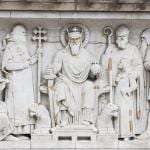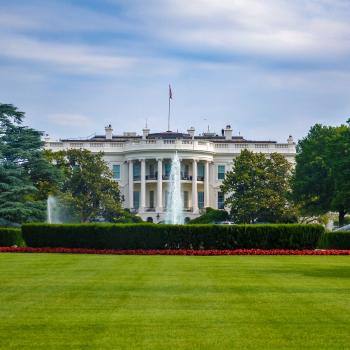
It’s that time again, when well-know, platformed pastors provide their unsolicited, generally unhelpful, advice on electoral politics. Given that I always, almost without exception, find said advice to be subpar (to put it gently), I thought I’d provide some notes from an 18th century election day sermon, that is, from a time when pastors were more equipped to pontificate on matters of the state. Drinking deeply from the well of New England election sermons is, in my experience, surer to quench one’s thirst in this regard than anything coming out of either The Gospel Coalition or your (un)friendly neighborhood discernment blog, and the like. Throughout the next week or so, I plan to post several rounds of notes from various election sermons from the 17th and 18th century to add both heat and light to our present, often chaotic and unmeasured, political discourse.
***
Even cursory familiarity with colonial election sermons, particularly those from New England, reveals a central theme that was, in one way or another, returned to again and again: the character of the good ruler. It should be remembered that, in the case of election sermons (as well as other times throughout the year), the preacher was addressing the newly elected or confirmed governor of the colony, as well as the entire General Court, and whatever other distinguished guests happened to be in attendance. Being asked to give the annual sermon was a high honor. Only the most respected clergymen of the colony were considered. Few turned it down. (One of my personal heroes, John Wise, was one of the few to do so; his son, Jeremiah, received and accepted the honor only five years after the elder Wise’s death.)
As T.H. Breen has shown, the consideration of the good ruler’s character occupied the better part of election sermons, and political discourse generally for that matter, of the 200 years they were preached with regularity in New England. (A survey of election sermon titles themselves evidence this.) Doubtless the fixation on this theme was natural for New Englanders, especially in the 17th century when the annual ritual was established on this soil. The combination of 1) residual medieval conceptions of political order, law, and society, and 2) the unique covenantal self-image of chosen-ness harbored by the citizens of Boston, Salem, Ipswich, New Haven, and the rest makes the focus on the character of rulers predictable. The character—which refers not merely to personal piety—and his administration would, it was thought, surely permeate the entire commonwealth, affecting all areas of life, not least of which being the happiness (in the classical sense of the word) of the populace.
Though this central theme dominated the eloquent pens of New England clergy, this is not to imply that sermons were, from one year to the next, mere regurgitations. Each one approached the matter uniquely, pulling in other considerations, depending on the context, for newly elected magistrates and governors, as we will see.
In the case of the sermon below by Daniel Lewes, interdependent, reciprocated trust between ruler and subject, as well as the patriotic pursuit of prosperity for the commonwealth are in view. Prudence too is identified as a necessary requisite of good governance.
***
Preaching an election sermon in 1748, Daniel Lewes (1685-1753), following a long rhetorical tradition, referred to civil rulers “fathers to their people.” The invocation of Isaiah 49:23 wherein kings are called nursing fathers was near constant throughout the seventeenth and early eighteenth centuries, as were related passages like Isaiah 22:21, which Lewes took as his primary text. The occasion was the election of William Shirely as governor of Massachusetts. (Shirely was generally thought well of during his service—first from 1741-1749 and then, 1753-1756—and was tenacious in pursuing the interests of the colony at home and abroad.)
“Civil Government is not an accidental Thing,” began Lewes, it is not a thing
“which Men have hit upon by Chance but is of Divine Institution; By Me Kings reign. The Powers that be, are ordained of God, says the Apostle. And this Ordination is so necessary that Public Communities cannot subsist without it. Anarchy unavoidably tends to Confusion and Ruin. When there was no King in Israel, ’tis said every Man did that which was right in his own Eyes. And when this comes to be the Case, a worse State of Things can hardly be imagined.”
Having briefly recalled the foundations of government and magistracy, Lewes transitions to the character and duties of men in high office, viz., that they should be “a father to the inhabitants of Jerusalem, and to the House of Judah.” The extent to which a ruler achieves this standard is a mark of his fitness to rule and worthiness of remembrance.
“And ’tis related of Augustus (who perhaps was one of the best and wisest of all the Roman Emperors, before the Christian Religion was publickly [sic] countenanced in that State,) that when the People offer’d him the Title of Lord, he refused it, and thought the Title of Pater Patria more honourable [sic], as indeed it was.”
Expounding on this point Lewes lists ways in which civil rulers (i.e. “political fathers”) should “manifest their paternal Regards to those who are under their Authority.”
First, rulers are to love their people with a fatherly, patriotic affection and care.
“The Love of natural Parents to their Children is exceeding great: Can a Woman forget her sucking Child? Intimating that it is a very unlikely Thing, and next to an Impossibility, David wish’d he might have died instead of his Son Absolom; Would God, says he, I had died for thee.”
This level of love cannot be expected of civil rulers. Nevertheless, “shall no Footsteps of paternal Affection be found in those who are political Fathers? Since both are stiled [sic] Fathers, may it not be justly expected, that there should be something similar to them?”
One of the distinctions inserted here is that of cordiality and mutual, reciprocal trust between the governor and the governed.
“Certainly, civil Rulers may be look’d upon rather as Tyrants than Fathers, if they be not cordial Lovers of those whom they rule over… The Truth is, if political Fathers have no real Affection for their People, ’tis not probable that there will be any mutual Confidence between them. They will always be jealous one of the other; and the One will be apt to rule as Tyrants, and the Other to obey as Slaves; because they cannot help it… So that it is necessary, in order to answer the Ends of civil Government, that Rulers should behave towards their People, with the Tenderness and Affection of Fathers. So did Nehemiah, David, and Jehoshaphat, and divers others in the first Chair of Government, which are found on Scripture Record.”
“And in the same Way, it is still the Wisdom and Duty of civil Fathers to conduct themselves towards their People: And if they do so indeed, doubtless they will find their Account in it, sooner or later.”
“‘Tis justly to be look’d upon as an high Favour when Rulers are ambitious of arriving to the Character of being Fathers to their People. All Things in the State will then probably be carried on with much Ease and Unanimity; Rulers will not grasp after more Power than properly belongs to them, nor the People be under a Temptation to wish it less than it is. And thus there will be an admirable Harmony between Rulers and Ruled, which is the Beauty and Glory of all Communities both civil and sacred.”
This posture of paternal love on part of the ruler toward his people rightly manifests in the protection of the latter by the former in times of war and strife, but also in the promotion of prosperity in times of peace. Both are instances of sacrificial love.
“How much of the Spirit of a true Patriot breathed forth in these Words, which proceeded from royal Lips; and how much of the Tenderness and Affection of a Father did they discover towards his People? And David spoke unto the Lord, when he saw the Angel that smote the People, and said, Lo, I have sinned, and I have done wickedly, but these Sheep, what have they done? Let thine Hand, I pray thee, be against me, and against my Father’s House. As a tender Parent will hazard his own Life to save his Child’s, so this good King had the Welfare of his Subjects so much at Heart, that he was even willing to redeem their Lives with the Loss of his own: These Sheep, what have they done? Let thine Hand, I pray thee, be against me.
“Civil Fathers, it may be, never act more becoming their Character, than when they manifest a true Concern for their People’s Prosperity, and how they may most effectually promote it.”
But Lewes recognizes that prosperity is necessarily dependent on stability, order, and good government:
“And here allow me to say, that a necessary Step to this Purpose, is to provide good Laws, and to take due Care that they be well executed; Laws that encourage Industry, and are designedly calculated to put Marks of Disgrace upon the Idle and Lazy; that Children born of needy Parents, be put out to Trades, and brought up in honest Callings: Hereby the Publick, in all Probability, will, not only be eased of a Bill of Charge, but reap the Benefit of their diligent Labours. That good Order, and seasonable Hours be kept in Houses of publick Entertainment; and Intemperance (the growing Iniquity of the present Age) be supprest [sic], if possible.”
The ruler’s duty includes reforming the “Lives and Manners of this People.”
“Therefore, it must needs have a great Tendency to promote the best Interests of a People when their political Fathers are Persons of eminent Piety, and bright Examples of pure and undefiled Religion… If a People see their Rulers to be loose or profane, they will either despise them, or be too ready to imitate their bad Example.”
In all of this prudence in administration is required.
“Civil Rulers, as Fathers of their People, should use much Prudence in exercising their Authority… For Want of prudent Management, Rehoboam lost the greater Part of his Subjects. Had he given them good Words, and followed the sage Advice offered him by his grave Counsellors, the unhappy Separation that ensued, might (humanely speaking) have been prevented: But his Conduct was such, even when his all, in a Manner (as to his Regal Authority) lay at Stake, that the worst of his Enemies could not wish him to act more foolishly than he did.”
“That Parent who governs his Children with a prudent Lenity or Gentleness, and appears to be deeply concerned for their Welfare on all Accounts, takes the surest Course to entitle himself to their sincere Respect, and to be truly honoured by them. Whereas he that is rigorous and always treats them in a churlish imperious Manner, is only slavishly feared, but not cordially loved.”
“And the Case is much the same as to Political Fathers: If by them the People enjoy great Quietness, and very worthy Deeds are done unto them, by their Providence, they probably will accept of it always, with all Thankfulness.”
***
What lessons can be gleaned from Lewes’ sermon? Five points immediately spring to mind (which have been bolded above).
The first Lewes lesson is not particularly unique. Government is an institution of God. Though, in the theory of popular sovereignty that undergirds modern democracies, the electorate, the populace, may be the mechanism by which God delegates governing power to certain men, the people are nothing more than that, a means. It is still God who bestows this power upon whomever he will. This should never be lost upon us. Though by the 18th century, popular sovereignty was emerging in more extreme versions—wherein power really was said to originate in the people, not simply flow through them—Lewes was sure to remind his audience from whence power truly originates. All of this may seem like a mundane, impractical point of political theory, but it matters. How we think about power, its source or origin, and purpose, determines how we respond to its use and distribution. It also influences how those invested with power wield it. If rulers understand that they are merely custodians and stewards of power that ultimately belongs to God, then they are more likely to exercise it responsibly, with caution and tenderness toward those who fall under their purview.
This brings us to the second lesson, and the central theme of Lewes’ sermon. Rulers are to be as affectionate fathers to their people. Contemporary Americans may instinctively recoil from this paternalistic language, but Lewes is aiming more at the proper disposition of those who rule, not any particular governmental structure. A fatherly posture, for Lewes, implies care and concern, sacrificial love, and true patriotism. The last word in that sentence is, regrettably, is often presented in scare quotes these days, as if it is either an unattainable fiction or a problematic vestige of the past that always requires groveling qualification. Like nationalism, patriotism is, in the estimation of some circles, tantamount to bigotry, xenophobia, and all the rest. But as Yoram Hazony has reminded us in his Virtue of Nationalism, there is a proper form and practice of both patriotism and nationalism that implies neither hubris or blood and soil fantasies.
In the most basic sense, healthy patriotism is something like what Roger Scruton called oikophilia, love of one’s homeland. Lewes is right to articulate political dynamics in familial terms. Love of one’s own family and friends does not infer hatred of others—nor does it negate additions to said family and friend groups. Love of one’s home is a prerequisite for statehood, sovereignty, prosperity, and all the rest. This starts, for Lewes, with the ruler. (More food for thought: see this excellent essay on Scruton’s thought by Richard Reinsch at American Affairs from 2017.)
But, per Lewes’ third lesson, the relationship between ruler and ruled is reciprocal. Respect between the two parties must be mutually reinforcing. To quote Lewes again,
“The Truth is, if political Fathers have no real Affection for their People, ’tis not probable that there will be any mutual Confidence between them. They will always be jealous one of the other; and the One will be apt to rule as Tyrants, and the Other to obey as Slaves; because they cannot help it… So that it is necessary, in order to answer the Ends of civil Government, that Rulers should behave towards their People, with the Tenderness and Affection of Fathers.”
Lewes’ language recalls the enmity between husband and wife that is introduced at the Fall (Gen. 3:15), and then, again, the instructions from Paul against provocation on part of fathers toward their children (Eph. 6:4). Something of the same reality of the first reference is present in political relationships, and something of the advice in the second reference is a necessary antidote. Antipathy and distrust between ruler and ruled will mark any society wherein reciprocal respect does not characterize the relationship. Avoiding this regrettable, potentially explosive, outcome begins with rulers cultivating trust with their people and treating them with respect.
Trust between governor and citizen is most conducive to stability and order, and this is Lewes fourth lesson. Contra most theories of international development, as its usually called, Lewes perceives that stability, order, and good governance are prerequisites for prosperity. And this all flows from the reciprocal trust just mentioned. Among other things, this requires that rulers endeavor to instill upright public morals in the populace, both by legislation and example. But it also requires that rulers respect the political traditions of the nation and the fundamental law, customs, and norms that govern it. To radically and rapidly change, or to run roughshod over, these foundations is to erode public trust and political stability, thereby ensuring that prosperity will never come.
This point is worth pondering as we approach an election wherein one party (and/or its acolytes) have suggested—with equal parts righteous indignation and retribution, and therefore, not affectionate fatherliness—to eliminate the electoral college, alter the structure of the legislature, increase the number of judges on the highest court (over and against a 160 year old tradition), and, perhaps, abolish the constitution as we know it. (Other wild theories, particularly regarding the Supreme Court, abound.) None of this indicates a fatherly patriotism, nor a concern for stability and order according to the particular character and traditions of this nation. Lewes would doubtless have seen all of this as imprudently hasty, which brings us to the last lesson to be gleaned from his sermon.
Rulers must exhibit prudence in all of their affairs. Were this not a classical virtue, Lewes comments on this subject would almost smack of Machiavellian realism. For Want of prudent Management, Rehoboam lost the greater Part of his Subjects. But what Lewes is offering is both the virtue and the pragmatism of prudence. Singling out prudence toward the end of his discourse, Lewes puts a bow, so to speak, on his entire train of thought: the prudent ruler will adhere to all that has been said prior thereto, for his own interests and that of his people; for the sake of reciprocal trust and mutual prosperity.
But to further flesh out Lewes’ intentions here, Neils Hemmingsen had this to say about prudence:
“Prudence is the knowledge of good things, evil things, and things that are both good and evil. Or, as Aristotle defines it: Prudence is a habit fit by true reason for doing those things that are profitable or harmful to the life of men. To it is opposed ignorance… That this prudence is required by the law of nature is clear form the fact that nothing can be done correctly without it.”
It would do us all some good to ponder these lessons from Lewes over the next week or so, as we elect national rulers for a new term, and to spend a little less time gobbling up the latest excited utterances from men that are not Lewes’ equal in learnedness, insight, or experience. Lewes has certainly not exhausted consideration of these things, but his sermon from 1748 is a good place to start.
Image creidt: @todd_diemer/Unsplash












